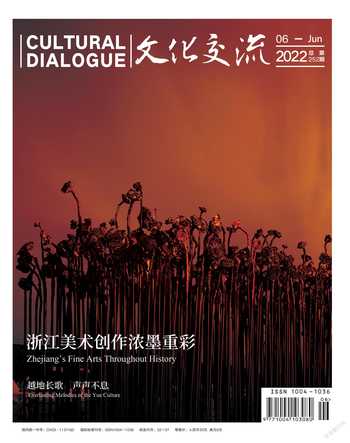贺敬之邀我畅谈
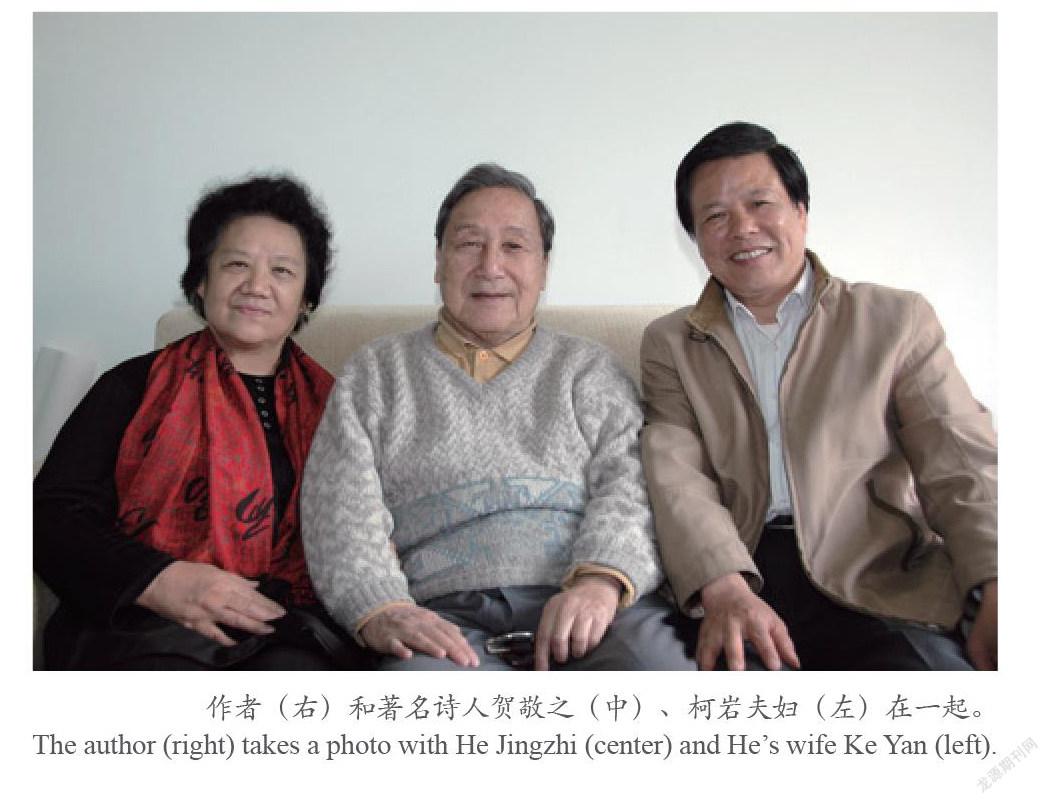
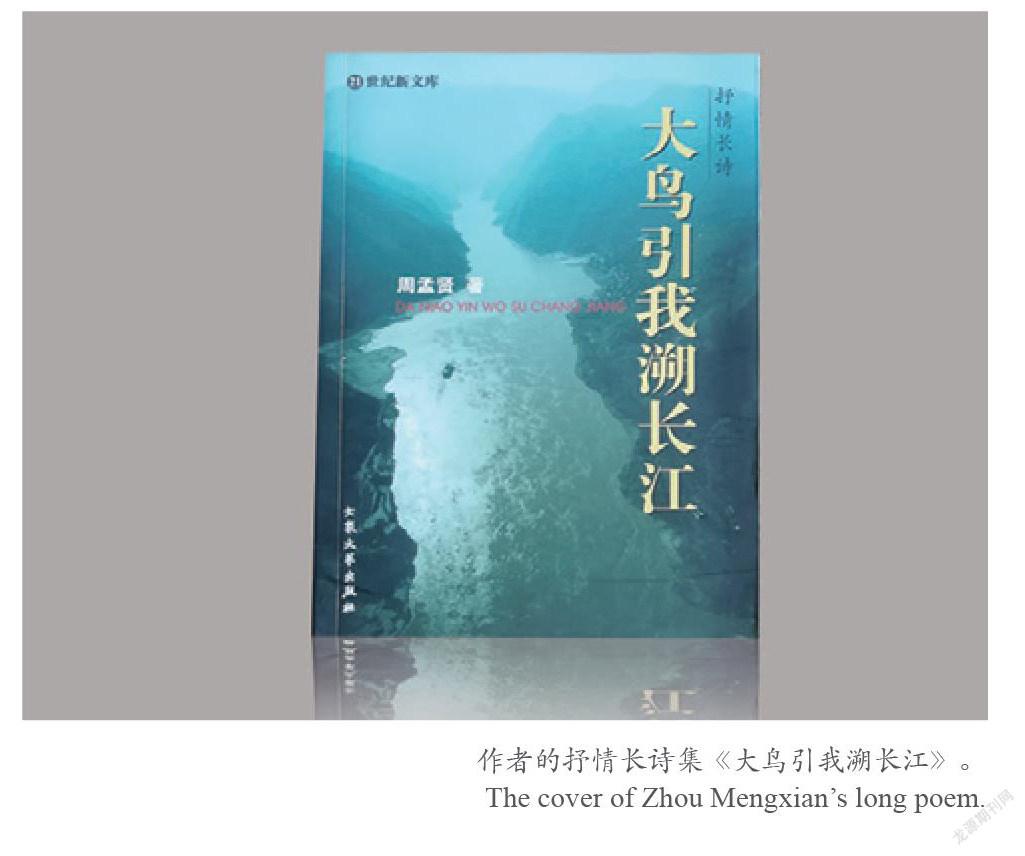
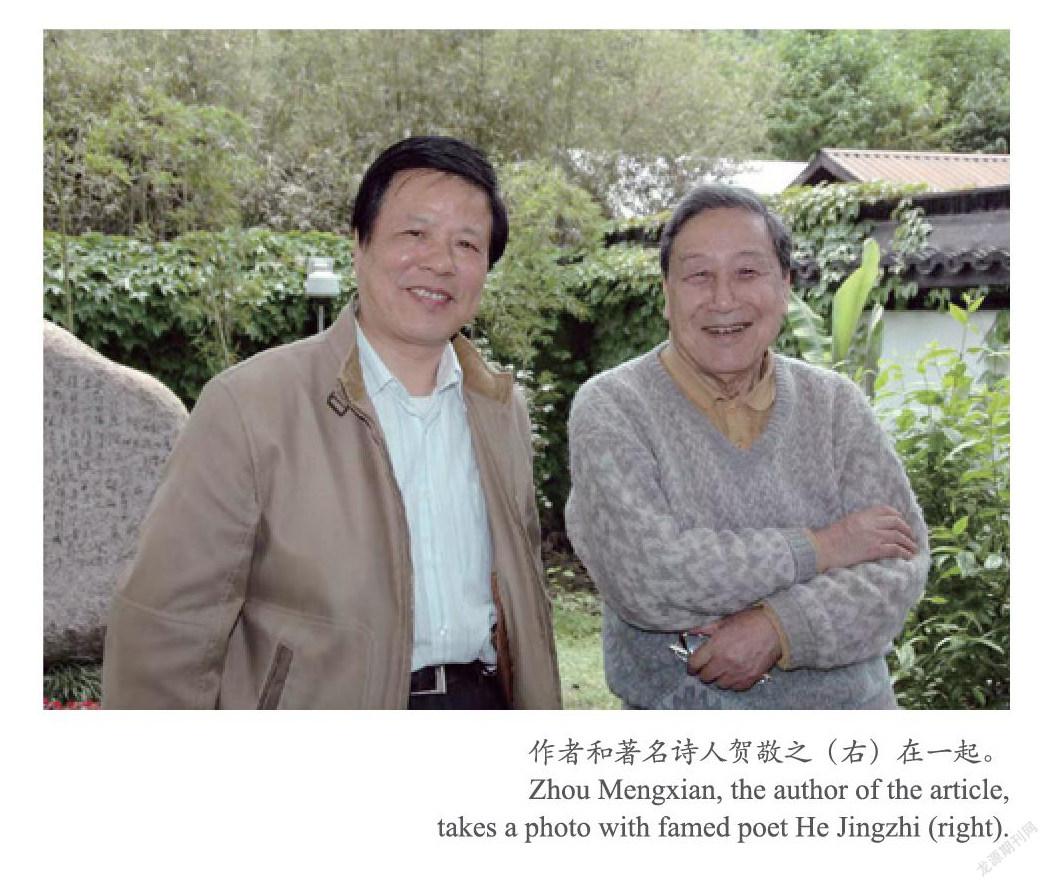
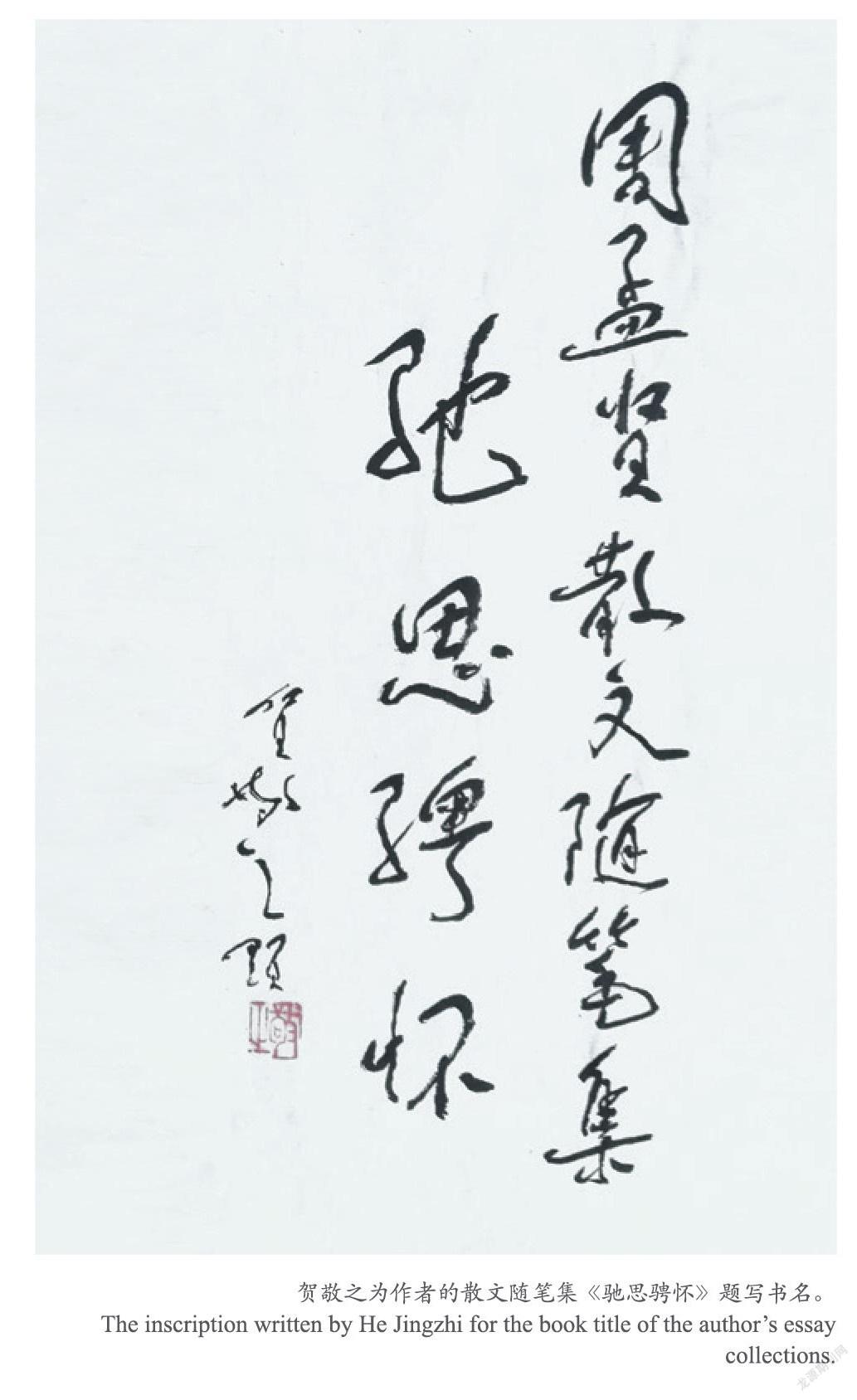
2022年1月30日,我收到一张照片,照片上看到贺敬之老先生坐在人民大会堂“2022年春节团拜会”现场。于是,晚上我便拨打了他的电话,贺老告诉我,他是坐在轮椅上去参加的。我说,您已经98岁了,了不起啊,可谓百岁诗翁了。贺老听后笑了,那笑声让我又想起了难忘的往事……
很多年前的一天,贺老突然出现在我的生活里,这让我大吃一惊!我不敢相信,更不会想到诗坛大家、歌剧《白毛女》作者贺敬之打来电话。他在电话里直接问道:“你是周孟贤同志吗?”我说:“是的。请问您是哪位?”“我是贺敬之。”紧接着贺老对我说:“看了你的抒情长诗《大鸟引我溯长江》,我非常高兴,非常激动!我发现你的长诗和我的思想感情完全一致,知音!我们要见个面,你到北京来,到我家来,我们好好畅谈!”听到这番话,我满脸的惊诧瞬间变成了满心的惊喜!
交谈中,我得知了原委:2005 年9月1日的《文艺报》发表了我创作的那首 1500 行的抒情长诗《大鸟引我溯长江》,诗中写了孔子、孟子、屈原、李白、杜甫、苏东坡、曹雪芹、鲁迅等近80位历史文化名人,贺老看后打听到我的宅电,这才从北京打电话给我。
自此之后,激动的我天天期盼着和贺老见面畅谈的日子赶紧到来。这一天终于到来:2008年4月初,老作家沈先生告诉我,本月下旬贺老来杭,他邀我见面畅谈。我心想,我要向这位大诗人当面请教有关诗歌创作的方方面面。
4月27日是个难忘的日子。我一早便驱车赶往杭州。一路上, 我不住地将目光“踮”过青山绿水,“踮”到西湖,“踮”到灵隐路白乐桥一号。同时,遥想心仪已久的大诗人该是何种模样,遥想历史上的王屋山人魏万,当年为拜访李白自带干粮,跋山涉水,行程三千里,终于写下让李白感动不已的“仙人东方生,浩荡弄云海,沛然乘天游,独往失所在……挥手杭越间,樟亭望潮还,涛卷海门石,云横天际山”一诗,诗中写到了吴越之地,也正是我与贺老相聚之地。
当我下车快步走向贺老时,居然情不自禁地背诵起他的诗,并在心里自语:正是贺老的诗作影响了年少时爱诗的我,谁知今天的脚步竟然真的迈向了这位大家,是谁的安排?是诗神缪斯?当我面对“中国作家协会创作之家”几个大字后,拨通了记在脑海里的贺老的电话号码,当我和贺老得以相见并紧紧握住贺老双手又紧紧拥抱时,时间是 9 点零 5 分。
一脸慈祥、满面亲和的贺老,头发虽有点儿花白却较为浓密,整齐地分梳在左右两边,那饱满的脸庞,那淡淡的眉毛,那亲切的目光,那肉鼓鼓 、厚笃笃的耳垂,那充满文气的举止以及那轻言轻语的仪态,都显得他本人非常温文尔雅,看起来很有福气。他衣着朴素得像是一位常见的社区老人,但他的气质、他的修养乃至他充满智慧的作品告诉我,他是一个杰出的文坛大家!
贺老穿一件偏灰加淡蓝色小点的羊毛衫,内穿一件淡黄色衬衣。我接过一杯绿茶,随后坐在了沙发上。贺老坐在椅子上,和我挨得很近。他的背后是窗户,窗外是山,是水,是绿树,是用色彩点染春天大地的红花……
贺老把椅子向我这边挪了挪,微笑着说:“今天,咱们放开来谈,想谈什么就谈什么。”是的,我们的交谈非常随意,非常轻松,也非常广泛,更多的时候谦虚的贺老反而要我多讲讲。于是,我把对中国诗坛、长诗和短诗、评论和评奖、做人和作诗的想法、关注、思考以及个人追求的使命目标,都直率地“抖”给了贺老。我还讲到,古往今来中国诗坛从不缺短诗但似乎缺长诗,不缺优秀的短诗,而缺少优秀的长诗,应该多多关注和关爱长诗,毕竟史诗性的作品——《清明上河图》式的作品,是由长诗(诗人)来完成的。我认为,优秀的长诗还是太少了。这里我说的“优秀”,主要指的是关注时代、关注现实且厚重大气、时代感强的作品, 即思想性和艺术性高度统一的作品。我觉得中国诗人应铭记一句古诗 :“天意君须会,人间要好诗。”
安静的贺老不住地点头,认真而又亲切地说:“好,说下去!”
这时,窗外休憩在大树上的小鸟正一个劲儿地欢叫着。
理智告诉我:须少讲,让贺老多说!我把话题扯到了他人生的最初经历。贺老娓娓道来:在饱尝战争之苦的岁月里,他告别了家乡山东贺家窑,告别了父母,告别了三间茅草房,转身投奔革命,在一辆黑压压挤满人的列车上,14岁的他爬上车顶……
犹记得,那时窗外的树枝在风中欢舞着。
专注聆听的我,想到了当年仅21岁的贺敬之创作完成了《白毛女》(丁毅续写结束处),这是一个绕不开的话题。我问贺老那年是在什么情况下开始创作的?
贺老告诉我,在他创作《白毛女》之前,有人写过但并没有得到认可。谁来写?经过考察和研究,最后领导相中了贺敬之。小小年纪的贺敬之经过艰苦劳作、反复推敲、深入思考和多次修改,终于完成了《白毛女》的创作,作品生动地表现了那个时代的深刻主题,并在演出中获得巨大成功,在老百姓中产生强烈反响,成为中国新歌剧发展的里程碑。
回忆中, 贺老讲到了当年自己和著名美术家华君武抡起大刀上舞台充当群众演员的故事,还讲到了他和丁玲、公木、李季、侯唯动、于兰、王昆、郭兰英等一起交谈、一同散步的往事……
这时,我们的话题又回到了诗歌创作上,我们兴致勃勃地畅所欲言。我讲了自己长期以来把主要精力放在抒情长诗的創作上,并先后在《诗刊》《中国作家》等报刊上发表《海中舟的叙说》《你在历史的深处》等数十首(部)长诗。说到这里,我赶紧刹住车,请贺老多多指教。
贺老喝了一口茶,微微一笑说:“看了你的1500行抒情长诗《大鸟引我溯长江》,深感全诗感情很真挚, 很深沉, 所以我对此很感动。你的长诗有着大思想、大奔放、大胸襟……相信你以后会写出更多更好的作品。”得到肯定后,我紧紧地握着他的手说:“谢谢贺老的鼓励!恳请贺老多多批评指教!”贺老笑了笑,接着谈到他对诗创作的见解,“诗不要意象叠加,不要形象太多,形象太多就模糊了”。贺老还谈到他的主张,即“诗还是要表现现实,要准确表现现实,从内容到形式,让社会认同”。我细细咀嚼着这些语重心长的话。
这时,贺老的夫人、著名诗人柯岩走了过来,笑着问起我关于创作、工作、生活和家庭的情况,还问到我的《大鸟引我溯长江》,怎么会写这部长诗?我喝了一口水,把内心深处的想法向贺老夫妇作了汇报:“几十年来,我坚持写长诗,力主用浪漫主义和现实主义的手法创作抒情长诗来记录一个时代,心想着今天就让我试着写一写吧!”而令我始料不及的是,《大鸟引我溯长江》在《文艺报》发表后,受到白桦、黎焕颐、贾漫、杨光治、骆寒超和李元洛等众多著名诗人、诗评家的好评, 面对“中国诗坛有周孟贤的长诗,从远的说,是《离骚》的回响;从近的说,是贺敬之、郭小川长诗的持续”这样的评价,我深感汗颜,更觉得这是对我的莫大鞭策!
接着, 我们三人谈了当今诗坛之现状, 谈了诗人应有的品格和担当精神。儒雅的贺老一边为我倒茶水,一边将椅子再次向我挪近。当和熙的春风又一次吹进窗内, 贺老笑眯眯地送了我几本书,柯岩大姐也送了我一箱书。我激动不已,连连致谢!
這时,我一看时间,已是14点10分了,贺老该休息了。天哪,我没想到和贺老竟一次谈了5小时零5分钟!我立即起身告辞,贺老对我说:“我从来没有像今天谈得那么多,也从来没有跟别人谈得那么久。”我对贺老说:“谢谢您!谢谢您!难忘!多保重!”贺老拉着我的手嘱咐道:“你到北京来,到我家畅谈。” 我点了点头,心中随即涌出一句古语赠予他——德厚者流光。
我紧握着他的双手,继而又紧紧地拥抱了他。
他转过身向前走去。我久久地、痴痴地凝视着贺老厚实的背影,一个在文坛有口皆碑、德艺双馨的大家的背影,一个走进中国文学史的背影……
A Five-Hour Inspiring Conversation with
Master Poet He Jingzhi
By Zhou Mengxian
On January 30, 2022 I received a picture of the 98-year-old He Jingzhi, a poet and playwright who was present at the Chinese Lunar New Year reception at the Great Hall of the People in Beijing. That night I made a call to Mr. He, who told me that he attended the event in his wheelchair. I responded by respectfully calling him “a remarkable centenarian poet”. Hearing that, the venerable man gave a hearty laugh, which brought back my memorable moments with him.
One day, many years ago, I got a surprise phone call from Mr. He, the very man who composed great poems and wrote the popular Chinese opera The White-Haired Girl. He told me that he was thrilled after reading my long lyric poem, which powerfully resonated with him and would like to invite me for a talk at his home in Beijing. His words filled me with joy.
From the following conversation, I learned the story behind his call. My 1500-line lyric poem that depicted around 80 notable historical figures was published on the September 1, 2005 issue of Wenyi Bao (Chinese Literature and Art Gazette). After reading it, he called me from Beijing.
In subsequent days, I found myself literally counting down the days. In early April 2008, Mr. He extended a welcome to me for a talk during his stay in Hangzhou later that month. Quite excited, I thought to myself that I would avail myself of the opportunity to seek guidance from Mr. He on poetry.
April 27 was an unforgettable day in my life. Early in the morning, I drove to Hangzhou. Along the way, I couldn’t help but imagine how the revered poet would look like. I found myself reciting silently Mr. He’s poem. With all that in mind, I marched towards the Writers House of the China Writers Association. At five past nine, I finally met the master poet. I excitedly held his hand and hugged him tightly.
Mr. He was kind and amiable with gray but thick hair neatly combed to both sides. His plump face, light eyebrows, friendly eyes, fleshy earlobes, and polite manner, all spoke of a cultured and blessed man. Though dressed modestly like an ordinary senior citizen, he could be easily identified as a great man of letters by his temperamental traits, his moral cultivation, and his works of wisdom. He wore a pale yellow shirt and a grayish sweater with light blue dots. He handed me a cup of green tea and I sat down on the sofa. He sat on a chair, close to me. Behind him were windows through which I saw hills, with green trees and red flowers that brightened up the spring.
Smiling warmly, Mr. He encouraged me to talk freely. And so we pursued the ensuing conversation lightheartedly, with me doing most of the talking. I honestly shared with him my thoughts on poetry in China, long poems and short ones, poetry criticism and awards, personal goals and missions, and what makes a decent man and a good poem. I also mentioned that China, from ancient to modern times, has seen large numbers of great short poems, but without an adequate supply of extraordinary long ones. The latter, I believed, deserves more attention and support as outstanding epic poems all fall into that category. Extraordinary long poems, in my view, are those whose subject matter mainly concerns the development of the society, grand in style and profound in meaning. In other words, they represent a perfect combination of literary and artistic values of poetry. As Chinese poets, we should always keep in mind that the public actually needs great poems.
Mr. He listened attentively, nodding his head from time to time, and encouraged me to continue. However, I was sensible enough to refrain from talking, so I diverted the topic to his early life. And thus, his personal stories unfolded right in front of me. At the age of 14, he left the war-torn hometown in Shandong province, his beloved parents and their three shabby thatched cottages. He climbed atop a crowded train on a journey of defending the motherland against Japanese aggression.
Even now, I could still remember how the branches outside the windows were dancing in the wind. Mr. He’s narration reminded me of The White-Haired Girl, the opera he wrote when he was only 21, so I asked him what had inspired him.
He said he was not the first one to try, but the previous version was not good enough. Young as he was, he decided to take on the challenging assignment. His laborious efforts eventually paid off and his work, vibrantly expressing topical themes, was well received by the public as a milestone in the history of Chinese opera.
He also recalled the day he and Hua Junwu (1915-2010), a famous Chinese cartoonist, danced together sword-in-hand on the stage as extras and the unforgettable casual conversations he had with his friends in the literary and art circles.
Coming back to poetry, both of us went in a more eloquent way. I told him that for years I devoted myself to writing long lyric poems and got dozens of them published, on which I then solicited guidance from him.
Taking a sip of his tea, he said that he was deeply touched by my 1500-line poem featuring intense and sincere emotions and that he was confident I would produce more and better poems. Then he continued with his perceptions of poetry such as his disapproval of an overuse of imagery and his endorsement for the role of poetry in reconstructing reality. His remarks set me thinking.
At that moment, Ke Yan, He’s wife and a noted Chinese poet, came along and asked me about my work, my life, my family and in particular, the reason I wrote the 1500-line poem. After sipping at my tea, I revealed to them my inner thoughts. For decades, I kept writing long poems and was a strong advocate for lyric ones. So I gave it a try and wrote the poem in question. To my amazement, after it came out, the poem garnered many positive reviews from quite a few well-known poets and poetry critics, which gave me great encouragement.
The three of us, then, talked about the present situation in poetry and the integrity and responsibilities of the poet. After a while, the couple gave me many books as a gift. Their precious present, together with the amiable gentleness of their smile, filled my heart with excitement and gratefulness.
At ten past two, I knew it was time to say goodbye. I did not know how time flew when all the while I was completely immersed in the 5-hour-5-minute conversation. Prior to my departure, I expressed my appreciation again to Mr. He who cordially invited me to his home in Beijing for another long talk. Nodding my head, I could not help but think of a saying that “the great influence of a man exemplifies his virtuous character”.
I held his hand tightly and gave him a big hug. Then, Mr. He stepped toward his room. I stood there, gazing at his receding figure, a man known in the literary world as much for his moral integrity as for his professional accomplishments.

